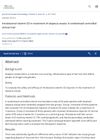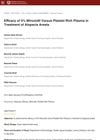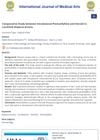 7 citations,
February 2022 in “Journal of Cosmetic Dermatology”
7 citations,
February 2022 in “Journal of Cosmetic Dermatology” Injecting vitamin D3 into the skin is an effective treatment for patchy hair loss.
7 citations,
July 2021 in “JAAD case reports” Dupilumab may help treat alopecia areata in children with atopic dermatitis, but it can also cause new hair loss.
 7 citations,
March 2021 in “Journal of the American Academy of Dermatology”
7 citations,
March 2021 in “Journal of the American Academy of Dermatology” Tofacitinib can regrow hair in alopecia areata patients, but some may experience flares during treatment.
[object Object] 6 citations,
September 2022 in “Vaccines” Some people developed alopecia areata after COVID-19 vaccination, but it's not caused by the vaccine and most improved with treatment.
4 citations,
July 2019 in “Experimental Dermatology” 2-deoxy D-glucose does not help with hair regrowth in alopecia areata.
3 citations,
October 2022 in “Journal of Cosmetic Dermatology” CAR is a useful marker for assessing alopecia areata severity.
3 citations,
March 2012 in “Journal of the Egyptian Public Health Association /Journal of the Egyptian Public Health Association” General practitioners in Qassim have satisfactory knowledge of alopecia areata but need more education to address gaps and misconceptions.
 3 citations,
February 2022 in “Rheumatology”
3 citations,
February 2022 in “Rheumatology” Baricitinib was effective in treating a patient with dermatomyositis and hair loss.
 2 citations,
July 2023 in “Journal of dermatology”
2 citations,
July 2023 in “Journal of dermatology” Alopecia areata causes a significant economic burden in Japan, mainly due to productivity loss.
2 citations,
January 2021 in “Indian Journal of Dermatology, Venereology and Leprology” Betamethasone is more effective for hair regrowth than latanoprost but has more side effects.
 2 citations,
July 2022 in “Journal of The American Academy of Dermatology”
2 citations,
July 2022 in “Journal of The American Academy of Dermatology” People with alopecia who are more resilient tend to feel less stressed.
 1 citations,
May 2023 in “Journal of the American Academy of Dermatology”
1 citations,
May 2023 in “Journal of the American Academy of Dermatology” Younger patients and those with more hair loss are less likely to benefit from oral steroid treatment for hair loss, and low vitamin D may predict relapse.
1 citations,
January 2021 in “Menoufia Medical Journal” Alopecia areata may be linked to heart issues.
1 citations,
January 2020 in “Indian journal of dermatology, venereology, and leprology” CD117 and platelet-derived growth factor receptor α may play a role in alopecia areata.
January 2025 in “Skin Health and Disease” Baricitinib may effectively treat both alopecia areata and immune thrombocytopenia.
 January 2025 in “Journal of Cutaneous Immunology and Allergy”
January 2025 in “Journal of Cutaneous Immunology and Allergy” Baricitinib is effective for treating severe alopecia areata in Japanese patients, but long-term safety needs more study.
 January 2025 in “Clinical Cosmetic and Investigational Dermatology”
January 2025 in “Clinical Cosmetic and Investigational Dermatology” Pediatric alopecia areata is more immune-active than adult cases, suggesting age-specific treatments and potential use of JAK inhibitors.
 December 2024 in “Pakistan Armed Forces Medical Journal”
December 2024 in “Pakistan Armed Forces Medical Journal” PRP is more effective than Minoxidil for treating alopecia areata.
 October 2024 in “International Journal of Research in Dermatology”
October 2024 in “International Journal of Research in Dermatology” Tofacitinib is a promising and safe treatment for moderate to severe alopecia areata.
 October 2024 in “International Journal of Medical Arts”
October 2024 in “International Journal of Medical Arts” Corticosteroids regrow hair better and faster than pentoxifylline for alopecia areata.
 August 2024 in “Frontiers in Public Health”
August 2024 in “Frontiers in Public Health” Alopecia Areata severely impacts mental health, causing anxiety and depression, affecting quality of life.
 August 2024 in “Clinical Cosmetic and Investigational Dermatology”
August 2024 in “Clinical Cosmetic and Investigational Dermatology” Upadacitinib and narrowband UVB effectively treated a child's vitiligo and alopecia areata.
 June 2024 in “Frontiers in immunology”
June 2024 in “Frontiers in immunology” Sequential therapy with dupilumab and baricitinib improved hair regrowth and atopic dermatitis in a child without adverse reactions.
 April 2024 in “JEADV clinical practice”
April 2024 in “JEADV clinical practice” Upadacitinib significantly improved both rheumatoid arthritis and alopecia areata in a patient.
 March 2024 in “JEADV. Journal of the European Academy of Dermatology and Venereology/Journal of the European Academy of Dermatology and Venereology”
March 2024 in “JEADV. Journal of the European Academy of Dermatology and Venereology/Journal of the European Academy of Dermatology and Venereology” New treatments for severe alopecia areata, especially JAK inhibitors, are recommended as first-line therapy.

Betamethasone dipropionate lotion is more effective than minoxidil solution for treating Alopecia Areata.
[object Object]  February 2024 in “Journal of the European Academy of Dermatology and Venereology”
February 2024 in “Journal of the European Academy of Dermatology and Venereology” Baricitinib is effective and safe for long-term use in severe alopecia areata, improving hair regrowth and quality of life with few side effects.
 February 2024 in “Journal of Cosmetic Dermatology”
February 2024 in “Journal of Cosmetic Dermatology” Using a laser with bimatoprost solution works better for hair regrowth in alopecia areata than bimatoprost alone.
January 2024 in “Pharmacoepidemiology” Patients with rheumatoid arthritis using tofacitinib had more serious side effects than those with alopecia areata.
 January 2024 in “Skin Research and Technology”
January 2024 in “Skin Research and Technology” Oral tofacitinib may be an effective future treatment for children with severe alopecia areata, but more research is needed.




















